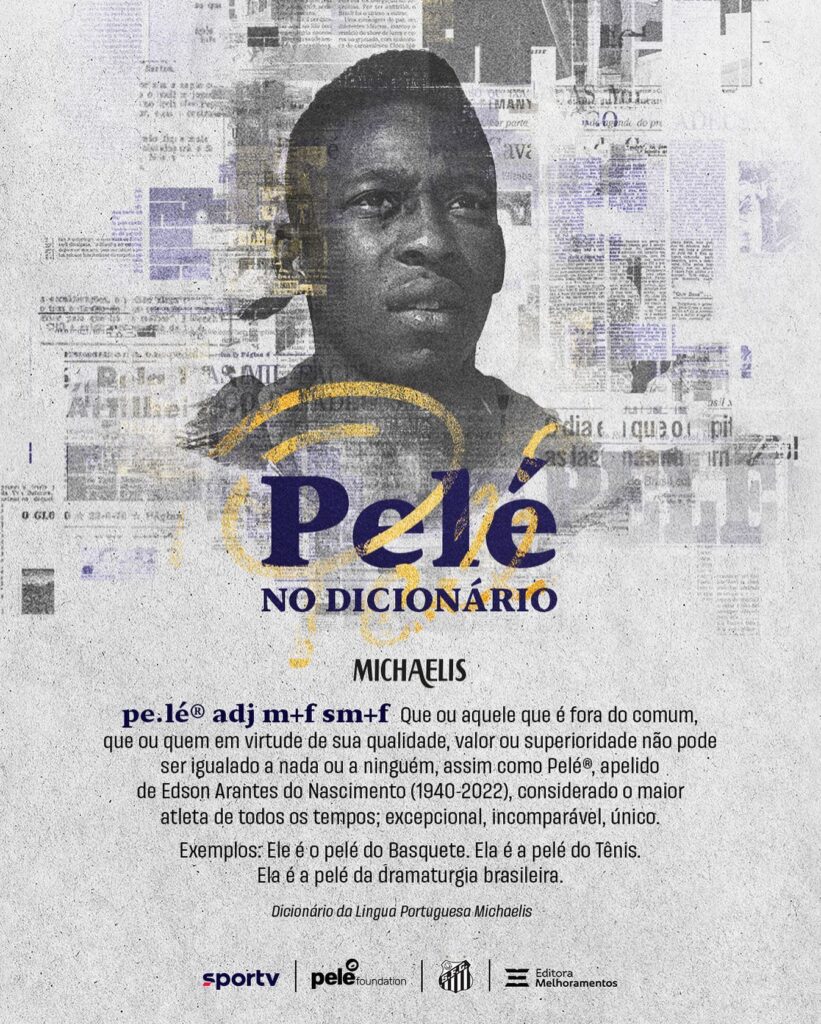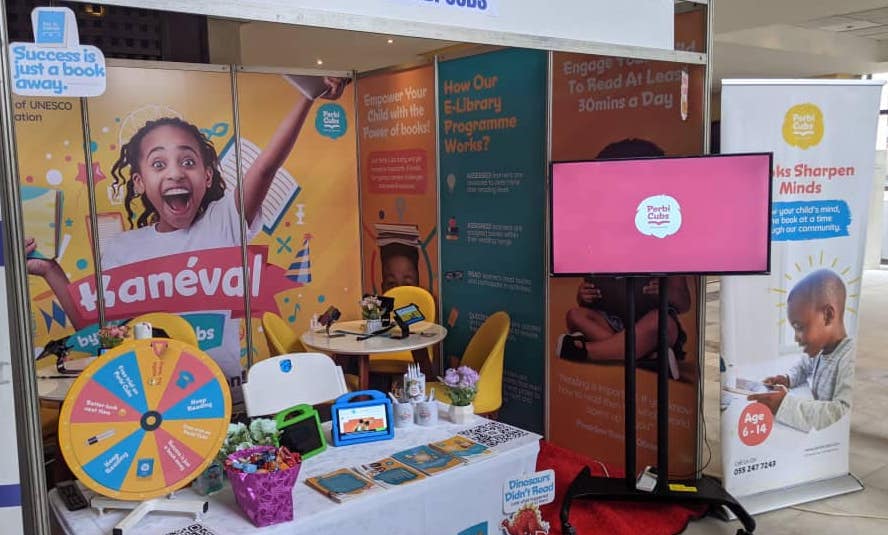
Introducing PELÉ (Perbi Executive Leadership Education).
Imagine a flourishing global ecosystem of authentic leaders characterized by healthy growth, holistic success and lasting significance. That’s the big dream and eternal hope fuelling our daily tasks at the Executive Education firm that bears my name, YAW PERBI. A couple of years ago, after eight years as President & CEO of a Canadian non-profit in the international education space and having garnered several years of executive leadership experience in the Ghanaian military and medical fraternity, global media, the United Nations in Cote d’Ivoire etc. I decided it was time to serve all of that to leaders of leaders: the C-suite. So I came out of sabbatical and stepped down as President of ISMCanada to do this.
Since according to my mentor of a quarter of a century, John C. Maxwell, by whom I’m officially a certified coach, speaker and trainer, that “one is too small a number to achieve greatness,” I have been steadily growing a global team of competent, caring, confident and character-based co-leaders on/from every continent in the world beyond myself to make our faith, sight. That journey has culminated in the birth of PELÉ.
A Play on Words
In keeping our focus on growing and coaching executive leadership to succeed, ever broadening the authentic relationships and resources we bring to bear on our task, we decided to move away from YAW PERBI specifically and to build Perbi Executive Leadership Education, PELÉ for short. PELÉ is not exactly just a happy coincidence, for as a once-upon-a-time football fanatic and soccer player for my elementary school, I recently engaged in my fair share of arguments about who the greatest soccer player of all time is between the shouts in favour of Lionel Messi after lifting the Qatar World Cup trophy on December 18, 2022 and the incessant calls to hallow the legendary Edson Arantes do Nascimento, better known by his nickname Pelé, who died eleven days later on December 29. As a double childhood hero—both of my dad and myself—I had been pondering a way to honour a Black man who gave everyone so much delight and so many people of his skin hue so much pride.
As I’ve stated before, “I am eager to particularly provide C-level executives of African descent with the paradigms, processes and tools necessary to maximize their potential, to be world class, take the world stage and make their dent in the universe.”
A Word In Play
Then came April 2023 when the Pelé Foundation and Sportv launched the “Pelé in the dictionary” campaign to pay tribute and recognise his legacy in other fields beyond sport. Of course his name has long been a synonymous with success and excellence, both of which are values of our Executive Education company, but now the great Brazilian forward and only human to have lifted three World Cup trophies officially had his name in the Portuguese dictionary. The adjective “Pelé” has been added to the Portuguese edition of the Michaelis dictionary to describe “someone out of the ordinary.”
Pelé, the nickname of the late football legend, has officially become tantamount to “extraordinary, exceptional, incomparable, unique.” Pelé is an adjective for something or someone that is out of the ordinary, one who by virtue of their quality, value or superiority cannot be equalled to anything or anyone, just like Pelé. For example, he is the Pelé of basketball, she is the Pelé of paediatrics.
What’s in a Name?
According to Emily Olson of NPR, “It was in the small, impoverished town of Bauru where he first got his nickname playing in youth leagues.” Apparently, even Pelé himself wasn’t sure where it came from, he wrote in a 2006 piece for The Guardian, but it may have been a play on Bilé, the nickname of a goalkeeper for the team Pelé’s father played on. “I can remember the name really bugged me at first. I was really proud that I was named after Thomas Edison and wanted to be called Edson,” he said. “I thought Pelé sounded horrible. It was a rubbish name. Edson sounded so much more serious and important.”
PELÉ by YAW PERBI is an Executive Education firm that offers authentic and customized relationships and resources to C-Level executives to grow personally, succeed professionally and become significant societally. To this end, the company provides Pelé services in leadership development, management training, executive coaching and publishing. Our Pelé coaching, authoring, speaking, and training are centred on LIFE—Leadership, Integrity, Family, Entrepreneurship.
Conclusion
We are PELÉ–extraordinary, exceptional, incomparable, unique–but more importantly, we form PELÉs, who are authentic, out of the ordinary executive leaders in every sector of life and all society’s centres of influence. As a forward-looking, authentic leader, if you want to dextrously dribble through LIFE and exceptionally hit goals like the legendary Pelé, you know where to look for the kind of coaching and training it will take: Perbi Executive Leadership Education (PELÉ). Like begets like.
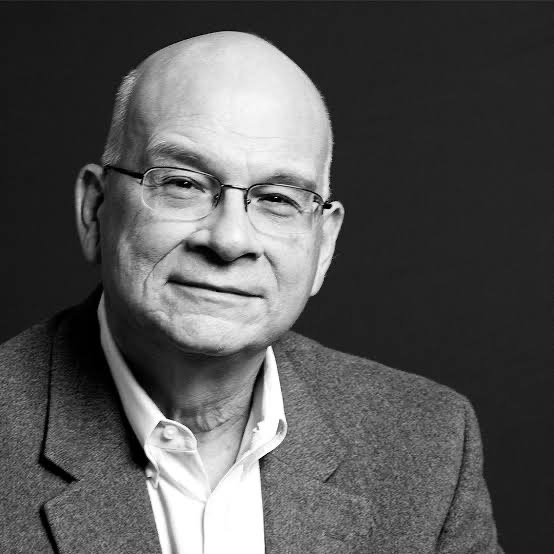
Tribute to Tim of my Table ~ Timothy Keller (1950-2023).
We first met on a table near the Table Mountain; I hope we meet again, in eternity, at a wedding table on a holy mountain.
In an emerging leader-affirming move, typical of The Lausanne Movement, my 32-year old self was appointed a table head at the Third Lausanne Congress on World Evangelization in Cape Town, South Africa. Imagine that. This was a gathering of the crème de la crème of Christian leaders from around the world, even described by some as “the most representative gathering of Christian leaders in the 2,000 year history of the Christian movement” (Christianity Today).
Each table had about half a dozen members. One of mine was Tim Keller. At the time, I had no clue who he was and quite frankly, couldn’t be bothered. Everyone was somebody. He wasn’t always at the table and even when he was there, he wasn’t quite there.
The Congress was over and everyone received their beautiful certificates of participation. Tim wasn’t there. Again. Apparently he had left back to the United States earlier. So I decided to travel back to Canada with his certificate, do an internet search of his whereabouts and mail his certificate to him in the States.
THAT is when I found out to my shock what a tall figure of a man this was! I eventually did get to speak with a staff and mail his memento to the right address (I would hope) in New York City. Rev. Dr. Tim Keller, founder and lifelong pastor of the 5,000-member Redeemer Presbyterian Church, was über brilliant and very deep—in head and heart. So deep that he had decided not to write any book till he was in his fifties. “Writing a book in your 50s will go twice as fast and be twice as good as if you try the same book in your 30s. It’s just good stewardship to wait,” he told The Gospel Coalition, which he was co-founder and Vice President of.
The other dimension I admired most about Keller was how ambidextrous he was in elucidating the gospel and engaging the culture, simultaneously! Stupendous! That, to me, was epitomized in his invitation to speak on his obviously Christian worldview book, ‘The Meaning of Marriage,’ at Google in Silicon Valley. Check out his presentation and responses to their questions and comments. Dr. Keller mentored many, near and far, in-person, in spirit and via media. Those around the world who were directly mentored through his Redeemer City to City should count themselves fortunate, blessed. I just spotted on Facebook a touching tribute from a pastor friend of mine from Brazil who recently planted a church in Rome, inspired and equipped by Rev. Keller.
As a latter day follower of Tim on Twitter, I admired the way he vulnerably yet resolvedly faced his imminent death, having been diagnosed with pancreatic cancer since 2020, a sequel to his 2002 thyroid cancer battle. All the while incarnationally demonstrating ‘The Meaning of Marriage’ through the dynamics with his wife of nearly 50 years, Kathy Kristy. Tim transitioned into glory on Friday the nineteenth (of May), 2023.
Dr. Tim Keller’s influence on the church and the world for Christ is deep and wide. I hope we share a table, again, at the grand, imminent marriage feast of the Lamb in eternity. Till then, Rest in Peace, champ! #Maranatha!

It’s the Family, Stupid.
Most people who are abreast enough with current affairs and know that “It’s the family, stupid” is a play on the famous slogan for the 1992 Bill Clinton election campaign (“It’s the economy, stupid”) will not know that today, and every May 15, is the International Day of Families. In my world it has never gained the popularity of, say, International Women’s Day. If it was so-scheduled to leverage Mother’s Day then it’s had the reverse, untoward effect of drowning it instead.
The Day was proclaimed by the United Nations General Assembly exactly three decades ago, in 1993, with resolution A/RES/47/237. According to the U.N., it’s supposed to reflect the importance the international community attaches to families, provide an opportunity to promote awareness of issues relating to families and to increase knowledge of the social, economic and demographic processes affecting families.
At Perbi Executive Leadership Education (PELÉ), we celebrate everything LIFE–Leadership, Integrity, Family, Entrepreneurship–and even currently have an ongoing Flourishing Families Masterclass running for the entire month of May. Whether it’s the more intensive Family Foundations Mastermind or the shorter and lighter Flourishing Families Masterclass, the following six perspectives are offered as a foundation for why family is ultra important (these are extracts from an e-booklet I’ve put together for the mastermind and masterclass):
1. CREATOR PERSPECTIVE | God is Family
God is family. Father-Son-Spirit. Note the familiar family terms, father and son. Having created humankind in His image and likeness to reflect on Earth what it is in Heaven, human family is huge deal. At the core of cosmos is a love relationship—Lover, Loved and Love itself. Everything rises and falls on love, everything rises and falls on God, everything rises and falls on family.
Of course, we could go into how God created the first family after declaring “it is not good for man to be alone,” how throughout scripture and history God chooses a person and their family to work through, the many scriptures that seek to protect, preserve and promote family etc. Even when God decided to wrap Himself in human flesh and move into our human neighbourhood in the person of Jesus Christ, he chose to implant himself in a family—Mary and Joseph’s. Everything rises and falls on family.
2. Centres of Influence | Every sphere is filled, fuelled and influenced by home
What do all of society’s centres of influence–Arts & Entertainment, Business, Science & Technology, Education, Government, Media, Religion–have in common: human beings! Without family there will be no human beings at all to fill, fuel and influence all these other centres. The only sphere that produces human beings is family. Most schools of thought include family itself as one of the centres of influence in society but I wonder whether family should even be included in the centres at all or just made to underlie all of them.
Family is literally the pivot of centres, symbolizing how everything truly revolves around it. Every centre rises and falls on family.
3. CRADLE PERSPECTIVE | Parents Shape World Shakers
Have you ever heard the proverb, “The hand that rocks the cradle rules the world”? That is 1865 wisdom unleashed on the world through the refrain of a William Ross Wallace poem that praises parenthood as the preeminent force for change in the world. Of course, at the time it was written, nearly two centuries ago, the work of raising children was mainly seen as the role of the mother but we know all too well it takes two to tango. Both father and mother have a role in rocking the cradle.
Parents, and the wider family, shape the people who would shake and move the world, for good or ill. These two PhDs, Barbara Riggs and Cynthia Tweedell, don’t mince words in their Marriage and Family textbook: “The strongest influence in your life will stem from family.” Period. Everything rises and falls on family.
4. CELLULAR PERSPECTIVE | Family is the basic unit of humanity
So yes, “it is the hand the rocks the cradle that is the hand that rules the world” but alas! today, everyone wants to change the world; no one wants to start at home. The irony! Not only does everything rise and fall on family because the hand that rocks the cradle rules the world, but also the family is the basic unit of society and humanity just as the cell is the basic unit of biological life or the atom is for all matter.
Yet somehow, we think we can flourish in the corporate world, government and such without adequately addressing the lowest common denominator! If you think one cell gone bonkers is no big deal, think again about cancer. That’s all it is. Individual cells gone bonkers, multiplying unhealthily—and eventually fatally spreading that craziness to other parts of the body (metastasis). Sooner or later a whole monarch or president or parent dies, all because of a cell gone awry. Everything rises and falls on family, that one cell.
5. CALCULATION PERSPECTIVE | Hindsight is 20/20
Today’s C-level executive claims, “It’s not the quantity of time but quality that I spend with my family that matters.” This is a fallacy. Family costs what it costs, and it doesn’t go on sale! The question is if we are willing to pay the price.
Even for the richest and most popular of leaders, when they assess their lives, doing a calculation of all they’ve spent their talents and energies, time and finances on, the truth remains that, “There’s no one who on their deathbed has been heard to say, “I wish I had spent more time at work.”
6. COVID-19 PERSPECTIVE | The only place to be/go has been home
When our all-important selves on our all-important endeavours were brought to a screeching halt by the recent Coronavirus pandemic, where did we all head? Home! When literally every economy and society locked down, where did we stay put and be safe: with family! I’ve never seen so many advertisements on primetime television asking people to stay home in my life! Heroes, according to the World Health Organization, stay home! Ha! Who would’ve thought that day would ever come?!
Even high-flying pilots have been grounded, literally, at home. At the time of first writing this down for the initial Family Foundations Mastermind we run during the pandemic, I hadn’t flown in a year—and that was incredible, considering that there were times in the last few years when I did as many as 70 flights in the year!
My VIP airport lounge passes and platinum airline and hotel statuses have been rendered useless. The only thing that mattered most was the people many of us paid the least attention to prior to COVID-19: family.
Crucibles reveal what’s most important. Now that this pandemic is over, we would need insignia to remind us, lest we forget, that everything rises and falls on family.
CONCLUSION
These are my compelling six cases for why family is absolutely a big deal, in every nation and generation. I long for the day when marketplace leaders will recognize the prime place of family and ensure their work(place) empowers families rather than diminishes them. “It’s the family, stupid.” Everything rises and falls on family. Happy International Day (Month is better) of Families.
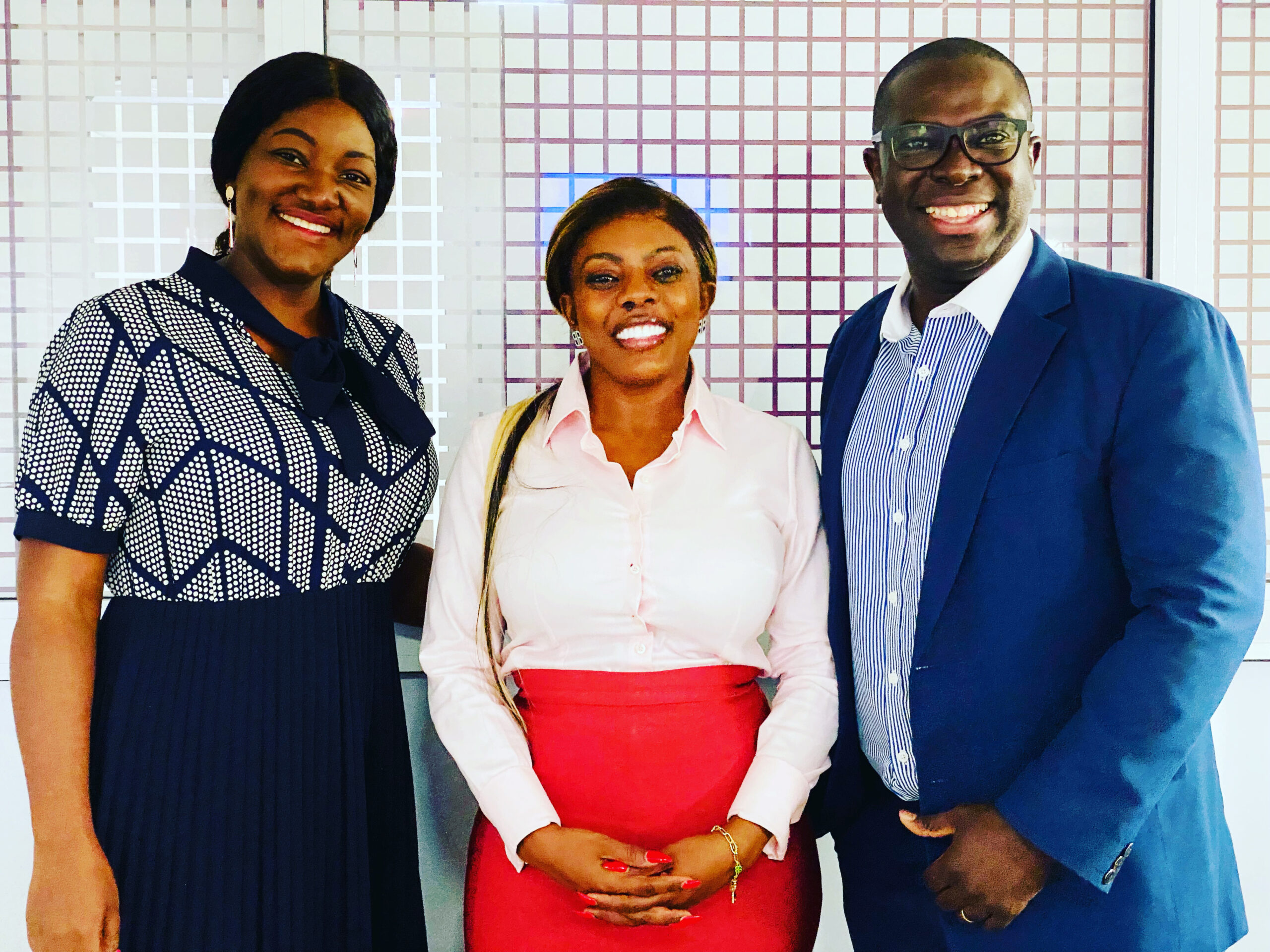
Of Kanévals, Kanébals & Kanévores.
Co-founders of Perbi Cubs sandwiching Kanéval partner-influencer, Nana Aba Anamoah, media personality & General Manager of GHOne TV/Starr FM.
This year, the capital city of Ghana where my wife hails from and where I was born has been named by UNESCO as its twenty-third World Book Capital. Accra takes over from Guadalajara, Mexico (2022) and will be handing the baton to Strasbourg, France come April 2024. Since ‘kané’ is the Ga word for read—and Ga being the language of the Accra people—Perbi Cubs Library services creatively replaced the near-homophonic ‘carni’ in ‘carnival’ with ‘kané’ and coined the word ‘Kanéval’ to bring fun to reading, which is otherwise unfortunately perceived widely as a bore and a chore.
As official partners of UNESCO Accra World Book Capital 2023 (AWBC ‘23), Perbi Cubs will be organizing Kanéval as a fantastic year-long program, a traveling fun fair transitioning from place to place with lots of amusements intertwined with lots of reading. You will find a fuller history of the UNESCO AWBC’23 partnership and details of the year-long fiesta here.
RESCUE FROM KANÉBALS
We are of the conviction that this Kanéval social service campaign needs to involve key influencers from all walks of life, from CEOs to Black Stars players to musicians, to consistently show that reading is fun and leads to success. The campaign will consist of various events in-person and online, including book fairs, storytelling sessions, and community outreach programs. By making reading fun and accessible, we can encourage more people to read and ultimately improve literacy rates in the community.
When we began approaching various influencers to join us on this reading revolution campaign, a massive behavioural change intervention, some of the stories we heard about the generally poor reading attitudes and habits of Ghanaian society were stupefying. We found kindred spirit in Nana Aba Anamoah (photo above), media personality and General Manager of GHOne and Starr FM, who unbeknownst to us had years back initiated a reading campaign known as ‘Raising Readers.’ She too had involved several influencers, including former Ghanaian president Jerry John Rawlings, to read with the children in a certain deprived area of Accra. Book donations in their thousands to the cause were a shot in the arm.
At some point it was clear parental involvement would bolster this behavioural change campaign. Some parent did accompany their children and wards to the reading sessions. Mostly reluctantly. In spite of these mostly illiterate parents sucking their teeth after only a little while, thinking of all the other more ‘productive’ ways they could be spending their time, Nana Aba and team pressed on. In fact, at the height of her intervention they had decided that once a week was not enough for the pace and profundity of the transformation they sought so they decided to leave books with the families and replace them when they returned the week after.
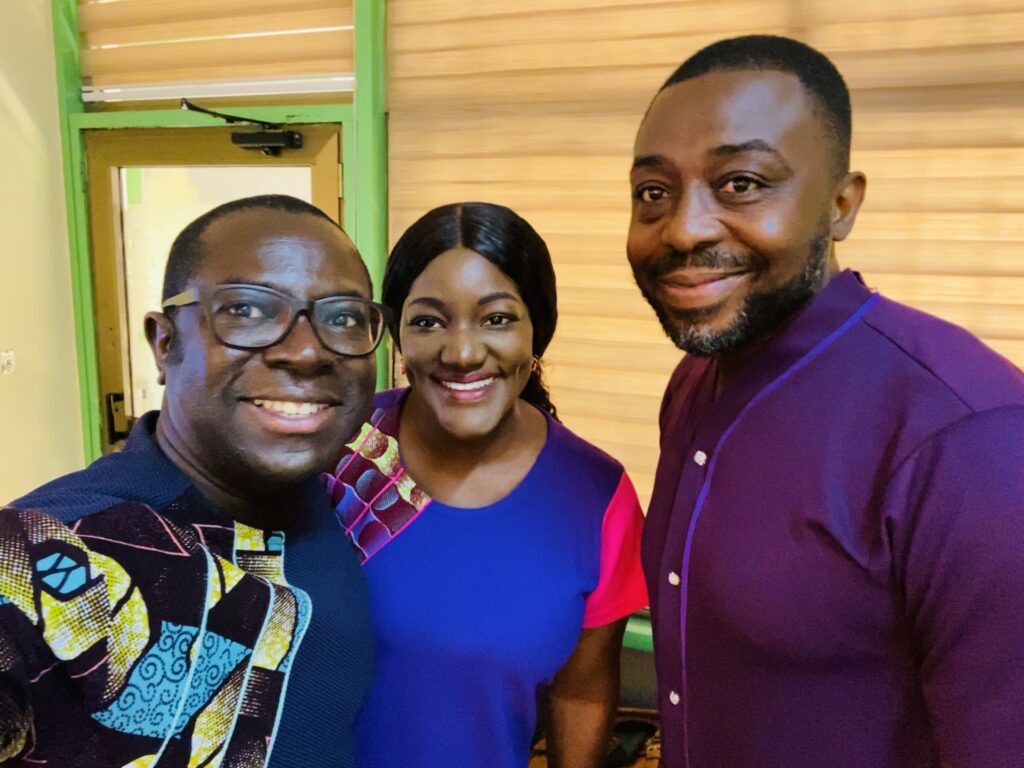
Cofounders of Perbi Cubs with yet another partner-influencer, Kafui Dey, author and GTV Breakfast host
All seemed well and good until the following week when some medical doctors on the Raising Readers campaign team who had gone down the road to grab some snacks returned with horror on their faces. When Nana Aba relates this story, she might not be aware but her face betrays the pain of the let-down she felt. The snacks that the team mates purchased in the catchment area had been nicely wrapped in freshly torn out pages of last week’s books! Kanébals (do you see what I’ve done with ‘cannibal’ and ‘kané’?) had dismembered the hitherto living literary friends, ripping them from their saddle-stitched and perfect-bound spines and repurposing the cadavers as food packaging. Ah!
When we related this story to another influencer on our bill, Kafui Dey (photo above), author and Breakfast host on GTV, he told us worse. Sometimes it’s pages of even the Bible that are Kanébalized for wrapping food!
WANTED: KANÉVORES IN THE KAPITAL
Perbi Cubs, convinced that readers are leaders and leaders are readers, has from inception sought to raise lion-leaders, hence the referral to our 10,000 young patrons as cubs (the young of lions) rather than the typical ‘kids’ (the young of goats).
By the end of the year-long Accra World Book Kapital, we seek to have enrolled an army of at least 100,000 cubs who are voracious readers, Kanévores. If carnivorous lions are the king of the jungle, we imagine that Kanévores rule the world.
KALL TO ACTION
According to UNESCO, as of 2021 only 6% of children in classes two and three in public basic schools could read and understand anything they read. Lack of sufficient reading resources and very large class sizes are among the root causes of the problem, but the overarching root cause is that society does not value reading. Reading is seen as a chore, a punishment or even a necessary evil! Yet per credible research, the love for reading is a stronger indicator of a child’s success in school and their future career than even their parents’ level of education and their socioeconomic status.
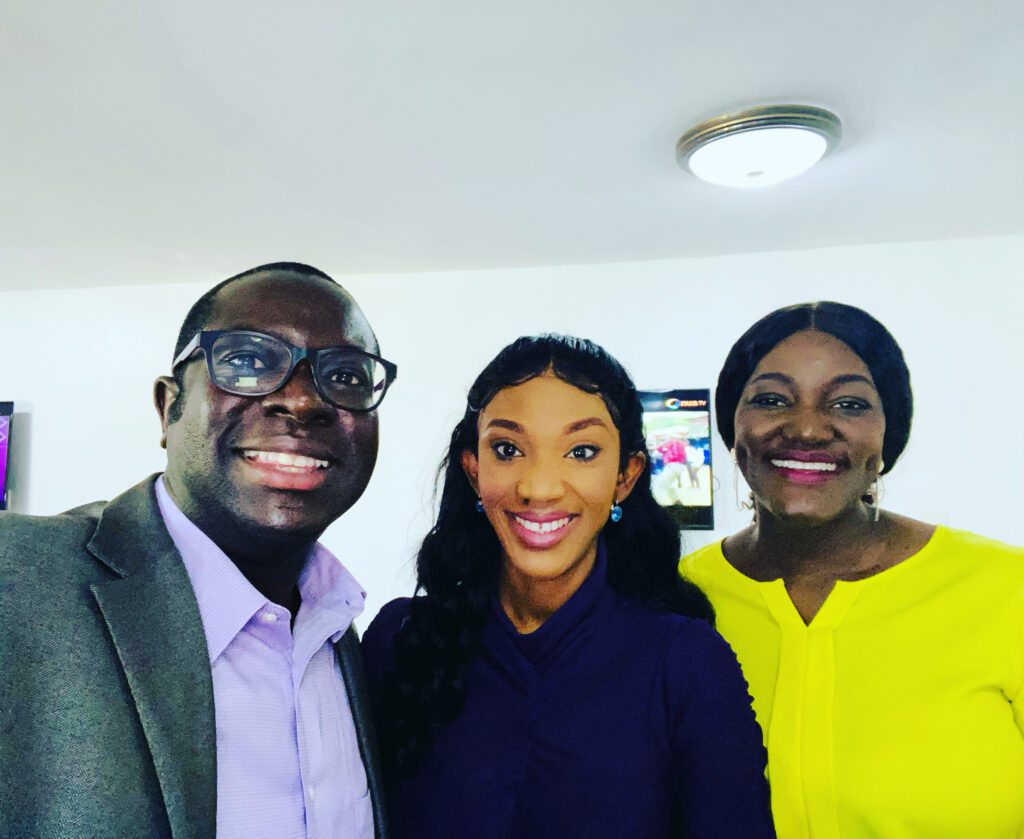
With media personality and reigning Ghanaian Journalist of the Year, Portia Gabor, at the TV3 studios in Accra. Portia’s partnering Perbi Cubs for this vital social intervention, Kanéval!
Join us in promoting the joy of reading and improving literacy rates in the community, particularly among children in public basic schools, by becoming a partner for Kanéval. Together, we can make a real difference in the lives of our community members and future generations. Let’s celebrate and make the most of Accra’s selection as UNESCO World Book Capital 2023.
KONCLUSION
Accra has been selected as UNESCO World Book Capital 2023 and Kanéval is a one-year social service campaign organized by Perbi Cubs, as official partners of UNESCO AWBC 2023, to celebrate this achievement and promote the joy of reading and improving literacy rates in the community.
The success of the campaign depends on a coalition of all stakeholders in the book industry, influencers, and strong partnership with the media. Together, through massive Kanévals all year, we can raise Kanévores and end apathy towards the written word that results in Kanébalism and the like. May readers rise and leaders come to light to transform society and impact the world—from Africa to the Rest.

Confluence for Influence: Kanéval by Perbi Cubs Leverages UNESCO’s Accra World Book Capital 2023.
Exciting news! Perbi Cubs Library Services is teaming up with the United Nations Educational, Scientific and Cultural Organization (UNESCO) and the Ghana Book Development Council, among others, to celebrate Accra World Book Capital (AWBC ’23) as official partners. Accra, the capital city of Ghana, in West Africa, is the 23rd city in the world, and only the fourth in Africa, to have the honour of this title which UNESCO initiated in 2001 to promote literacy globally. This is akin to a literacy World Cup title, only it is bestowed annually.
The World Book Capital is an initiative of UNESCO which recognizes cities for promoting books and fostering reading for a year, starting on April 23, World Book and Copyright Day. UNESCO adopted the 31 C/Resolution 29, in 2001, establishing the World Book Capital (WBC) programme. Cities designated as UNESCO World Book Capital pledge to carry out activities with the aim of encouraging a culture of reading and diffusing the values of literacy, lifelong learning, copyright, and freedom of expression in all ages and population groups, both within and beyond national borders. The first city to be awarded was Spain in 2001 and Accra’s turn is sandwiched between Guadalajara, Mexico (2022) and Strasbourg, France (2024).
The UNESCO World Book Capital Advisory Committee, which evaluates bids to win the title, comprises representatives of the International Publishers Association (IPA), the International Federation of Library Associations (IFLA), the International Authors Forum (IAF) and UNESCO. Past capitals include Madrid (2001), Alexandria (2002), New Delhi (2003), Anvers (2004), Montreal (2005), Turin (2006), Bogota (2007), Amsterdam (2008), Beirut (2009), Ljubljana (2010), Buenos Aires (2011), Erevan (2012), Bangkok (2013), Port Harcourt (2014), Incheon (2015), Wroclaw (2016), Conakry (2017), Athens (2018), Sharjah, (2019), Kuala Lumpur (2020) and Tbilisi (2021).
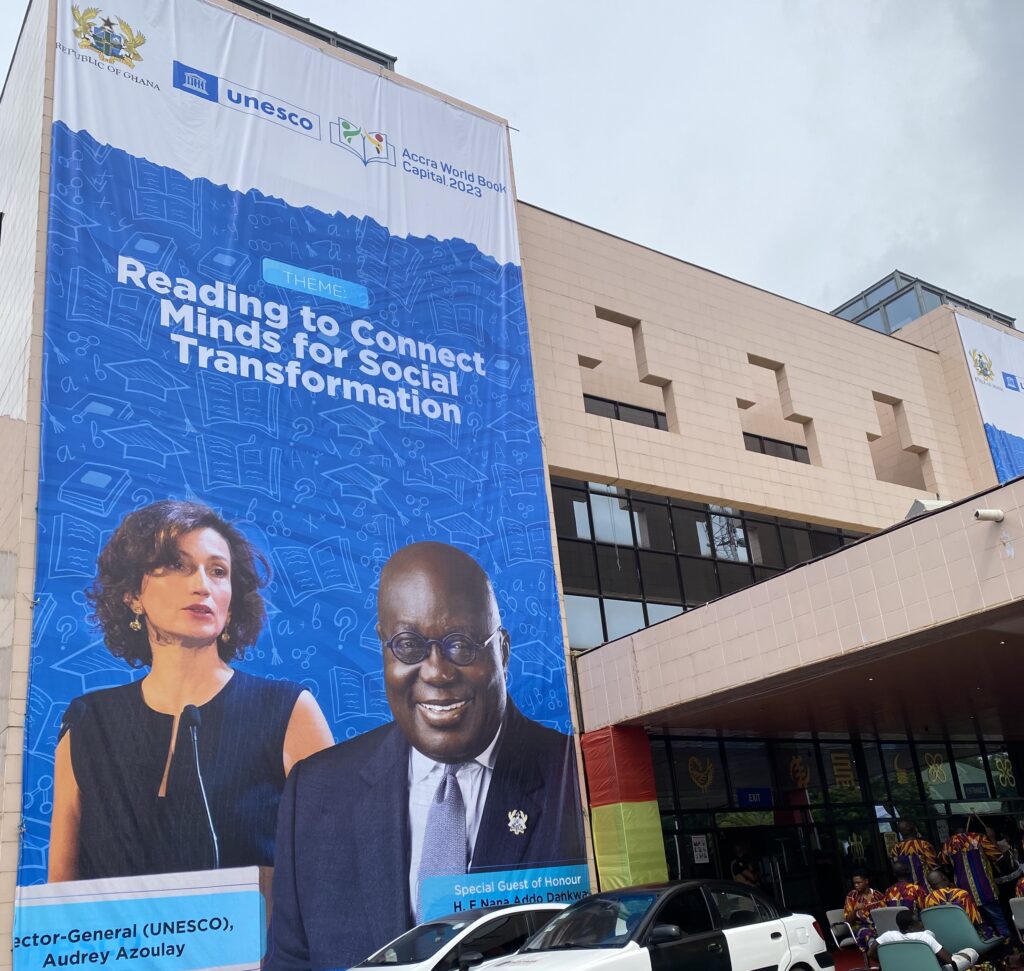
The grand opening ceremony of Accra World Book Capital at the Accra International Centre by the President of the Republic of Ghana
THE GHANA JOURNEY
Accra’s first attempt to win the 2019 World Book Capital title, after the idea was mooted in 2016 and working towards that, failed. Accra relaunched the bid in April 2021 and won it. The executive board of UNESCO, at its 215th session in Paris, France, on September 22, 2021, named Accra the World Book Capital 2023, following evaluation by the World Book Capital Advisory Committee. This was no mean achievement for the ten-member bidding team representing the Accra Metropolitan Assembly, Ghana Commission for UNESCO, Ghana Library Association, Ghana Publishers Association, Complementary Education Agency (formerly Non-Formal Education Division), Ghana Association of Writers, and the Ministry of Foreign Affairs and Regional Integration and chaired by Mrs Ernesticia Lartey Asuinura, the Executive Director of the Ghana Book Development Council (GBDC). Several internal staff of GBDC were behind this successful bid and must be applauded.
According to UNESCO, “the city of Accra was selected for its strong focus on young people and their potential to contribute to the culture and wealth of Ghana. Accra’s proposed programme seeks to use the power of books to engage these young people, as an effective way of skilling up the next generation.” Earlier this year, on April 11, the Minister of Education of Ghana, Dr. Yaw Adutwum, held a press launch of AWBC’23 at which Perbi Cubs was represented by the Founder and CEO, Mrs. Anyele Perbi. He explained that Accra was selected ahead of other cities because the Education Ministry’s programmatic focus was on young people and their ability to contribute to the culture and wealth of Ghana through the power of reading. “Research shows that reading improves the learning outcomes of students in schools,’ said the Minister. “That’s why in certain schools around the world, they’ve implemented and employed the ‘Drop Everything And Read’ – ‘DEAR’. So if it’s 15 minutes, 20 minutes a day, children are made to stop everything and read,” he illustrated.
Dr. Yaw Perbi, Global CEO of The HuD Group and Co-Founder of Perbi Cubs, and Mrs. Anyele Perbi , Founder and CEO of Perbi Cubs, were invited and did attend the grand opening of AWBC ’23 by the President of the Republic of Ghana, Nana Addo Dankwa Akufo-Addo, and the Director-General of UNESCO, Madam Audrey Azoulay Ayoub, at the Accra International Conference Centre. The theme for the occasion was ‘Reading to connect minds for Social Transformation’. It was encouraging interacting with school children as well as top academics at the Perbi Cubs booth, including members of the Ghana Academy of Arts and Sciences. Visiting the exhibition booths of other players in the literacy space was also invigorating but nothing beat the joy of seeing the attending school children flock to the Perbi Cubs stand to sample for a few minutes the thousands of books on their online platform.

Several groups of school children practicalized the whole point of AWBC by doing actual reading at the launch
Under the theme ‘Reading to connect minds for social transformation’ the programmes planned for the title year will focus on particularly the youth and vulnerable groups in Accra (and Ghana at large) such as children, underemployed women, head-porters (kayayei) and persons living with disability, to equip them with literacy and employable skills, while promoting the rich Ghanaian cultural heritage and the book industry in Ghana.
THE PERBI JOURNEY
Both Yaw and Anyele Perbi (née Ampa-Sowa) come from homes full of books. In fact, they got to know each other as children of professors at the University of Ghana campus. Anyele’s dad was an Economics lecturer and Yaw’s mum, a history lecturer. In their growing up years Yaw’s own dad, being a long-time member of the board of Challenge Bookshop, would receive loads of books every year, feeding their home library fat.
Tracing the history of books even further, Yaw’s maternal grandfather was not only an author and professor of African Studies and Ethnomusicology at the same university, but also together with writer and educator Dr. Efua Sutherland organized the first international book fair in Ghana in the early 1970s and proceeded to come together to found Afram Publications a couple of years later, incorporating it in February 1973. Emeritus Professor J.H. Kwabena Nketia was his name.
The Perbi household buzzed with books and moments like when the floating bookshops, the MV Doulos or Logos ships, would berth at the Tema Harbour were fun galore. Meanwhile, Yaw did not like reading as much as Anyele in their early years on the Legon campus. Anyele LOVED reading to the point that the rate of buying books for her and her two brothers was threatening to bankrupt her parents. When she was missing from the house you could be sure she was immersed in a book somewhere!
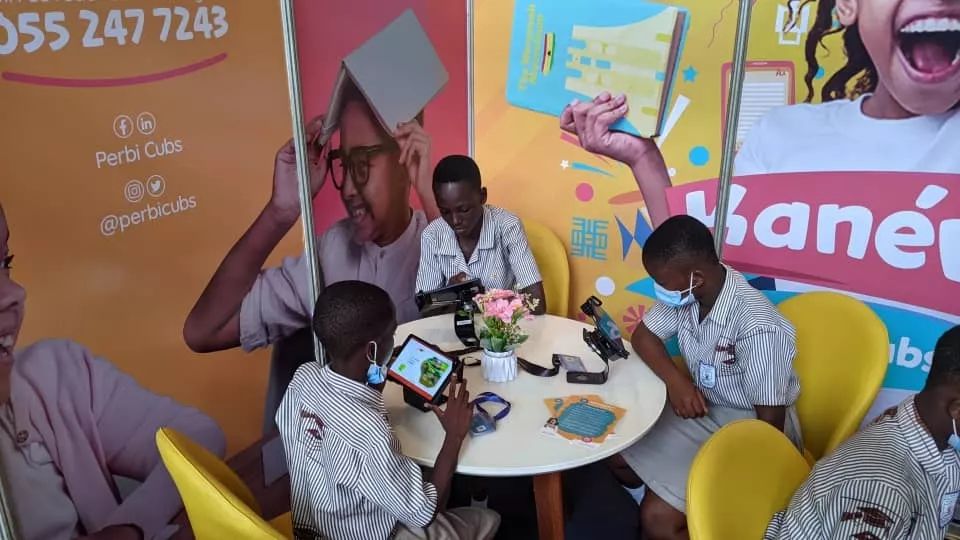
At the intersection of age old reading and new technologies stands Perbi Cubs’ online digital reading platform and offerings
Two jerking statements changed Yaw’s attitude towards books. The first was, “If you want to hide something from a Black people, put it in the book.” You may read the full story here. Fascinatingly, by the age of twenty-three, Yaw would write and publish his first book, What Every Fresher Should Know about University, and as an internationally-recognized author of some twenty books and several book chapters, journal articles etc. now, as they say, the rest is history. Today, one of his punchy books called Read! is subtitled: “You are ‘illiterate’ if you can read but don’t.” Dr. Perbi’s 2015 Thinking Outside the Window was even an Amazon bestseller in its category. His latest book, co-authored with a Kenyan and published in March 2023, is entitled Africa to the Rest. In it, Yaw stresses the need for Africans not only to read but also to write. “Until the lion learns to write,” he reminds us, quoting an old African wise saying, “every tale of the hunt will glorify the hunter.”
When Yaw founded The HuD Group in 2003, one of its first divisions was a library called The Mine (it still runs at the Staff Village of the University of Ghana). So for at least two decades now, Dr. Perbi has been a fierce reading campaigner. And now in tandem with the erudite Anyele, he likes to say “my wife and I have stepped up by stepping down.” What he means by that is, they’ve enhanced their reading campaign (stepped up) but decided to go further down to the age where humans are most pliable: childhood (stepping down). And they began with their our own seven children in the French city of Montreal, Canada which happens to have been the UNESCO World Book Capital in 2005, four years before they would dwell there as a family for the next dozen years. Their own children’s love for reading, the generous 40 books per person supply of the Pierrefonds municipal library across the street from their West Island home and an imminent eight-month visit to Ghana that threatened to stifle this Perbi reading culture combined to birth the Perbi Cubs Library Services. You may find the story and philosophy behind Perbi Cubs here.
AND NOW, KANÉVAL
According to Perbi Cubs CEO, “We are excited to inform you that Perbi Cubs, in partnership with UNESCO Accra World Book Capital 2023, will be organizing a fantastic year-long program. Watch out for Kanéval as it moves round throughout the year, to your school or community. Stay tuned on the various Perbi Cubs social media handles like Facebook, Twitter, LinkedIn and Instagram for more updates.” Kanéval by Perbi Cubs, a season of fun, inspiration, and BOOKS, is launching in Accra on May 11, 2023.
As long as reading remains a chore, we’ll have a problem promoting it. But who doesn’t love a good festival, a carnival? What if we could think outside the box and bring together the idea of a traveling amusement show with merrymaking sideshows, rides, etc. with reading? What if face-painting or getting on a swing was a reward for reading a book? These are some of the disruptive ideas that incubated and eventually hatched Kanéval. The idea of Perbi Cubs in general and KANÉVAL in particular, is to bring FUN to reading while strongly brandishing the connection between reading and success in life.
In the spirit of innovation and creativity, Perbi Cubs values, the coined word Kanéval was inspired by the word for read in Ga, the language of the Accra people, Kané. So combining ‘Kané’ with the English word ‘carnival,’ here we are! There will be lots of fun, reading and other educational activities. Perbi Cubs is grateful to several Ghanaian influencers like Nana Aba Anamoah (media personality and General Manager of GHOne TV and Starr FM), Bernard Avle (Citi Breakfast Show host and General Manager of Citi FM), Kafui Dei (author, speaker and GTV Breakfast host), Portia Gabor (TV3 hostess and Ghana Journalist Association’s reigning Journalist of the Year), Gwen Addo (entrepreneur, author and CEO, The Hair Senta), Giovani Caleb (media personality, radio and TV), Gifty Anti (author, media personality, celebrated journalist) and others who are synergizing with them to take the culture of reading to the next level to transform the fortunes of Ghana and Africa.
Perbi Cubs’ Kanéval is scheduled to take off on 11th May, 2023 at Alpha Beta Education Centres and then to all their partner schools and other communities, particularly deprived ones badly needing a literacy intervention. Kanéval is not just for our Cubs but all our stakeholders including you. There are many activities you can join in with exciting prizes. Kanéval awaits you for a Kanévalistic experience. Kanéval – Reading is fun!!! The amazing part is that in collaboration with various partners, Perbi Cubs is offering huge discounts on their subscriptions so that every Cub in their partner schools can read this year!
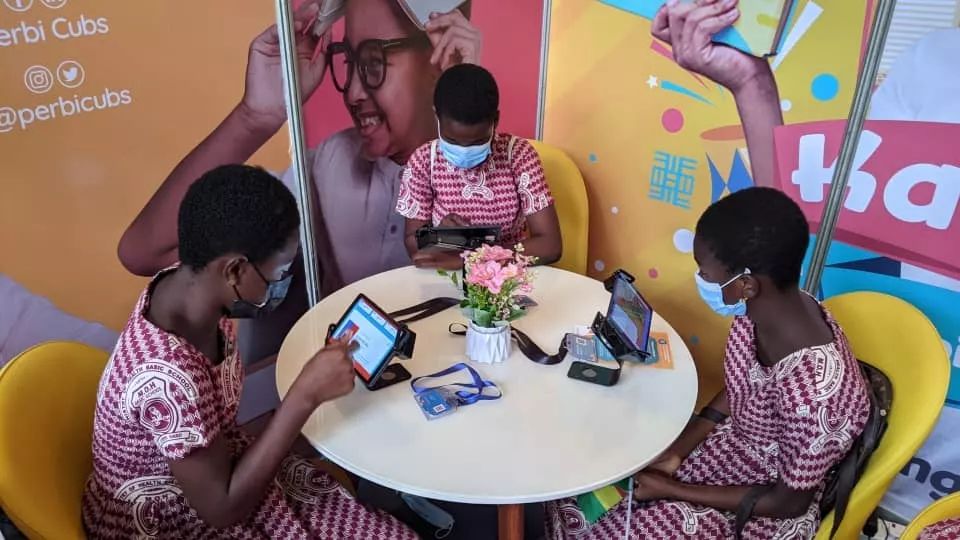
Perbi Cubs has served about 10,000 children so far and is set to scale that in this AWBC year to 100,000
WE HAVE A PROBLEM
Kanéval is fun about something serious. And Ghana in particular has a problem that isn’t funny. As a society we do not value reading enough. If research has proven that the love for reading is a stronger indicator of a child’s success in school and prosperity in life than even their parents’ socioeconomic status or level of education, then we should be worried that only 6% of Ghanaian children at classes two and three can read and understand what they read (UNESCO 2021). Meanwhile the World Book Capital Network (WBCN) acknowledges and reminds us of the power of books and reading as cornerstones to more inclusive, peaceful and sustainable societies. Thus as they rightly put it at Perbi Cubs, “Success is just a book away,” be it personal or national.
Let this be the year we all got dead serious about raising the tide (the general level of literacy) that lifts all the other boats, all sectors and subjects, including STEM. O that the confluence for influence between Kanéval by Perbi Cubs, influencers like those cited above and all other players in the UNESCO’s Accra World Book Capital 2023 space will do the trick. Let’s get on with this serious business, having fun along the way. Kanéval it is!
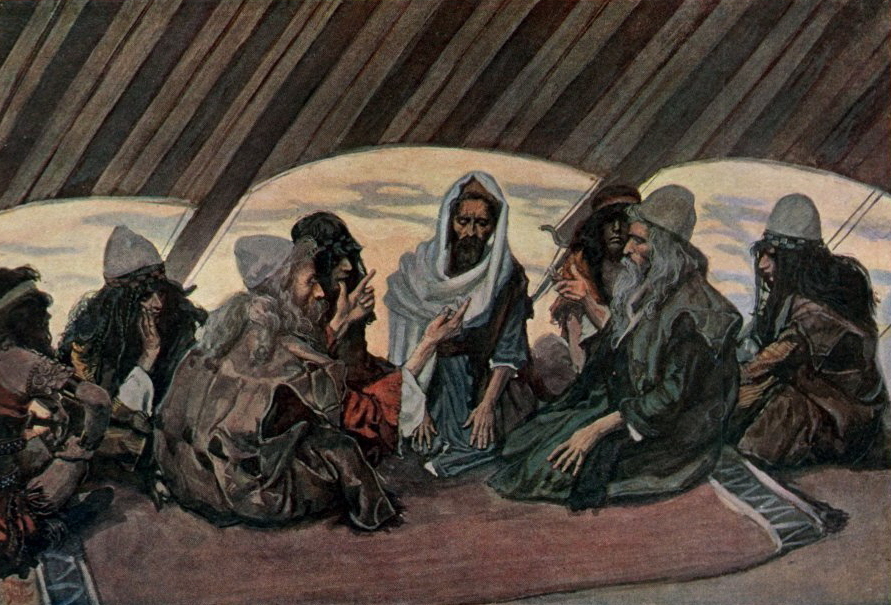
Competence is Character.
Photo credit: Jethro and Moses, watercolor circa 1900 by Jacques Joseph Tissot (1836–1902), courtesy of Wikimedia.
While a lot of #leadership thinking is that leadership comprises #competence AND #character, for others like Jethro of Midian, competence IS character. Discuss.
For the Eager Beaver:
“Listen now to me,” Jethro advised Moses his son-in-law regarding leadership delegation, “Select capable men from all the people–men who fear [revere] God, trustworthy men who hate dishonest gain–and appoint them as officials over thousands, hundreds, fifties and tens” (Exodus 18). Jethro, also known as Reuel, was a Kenite shepherd and priest of Midian.
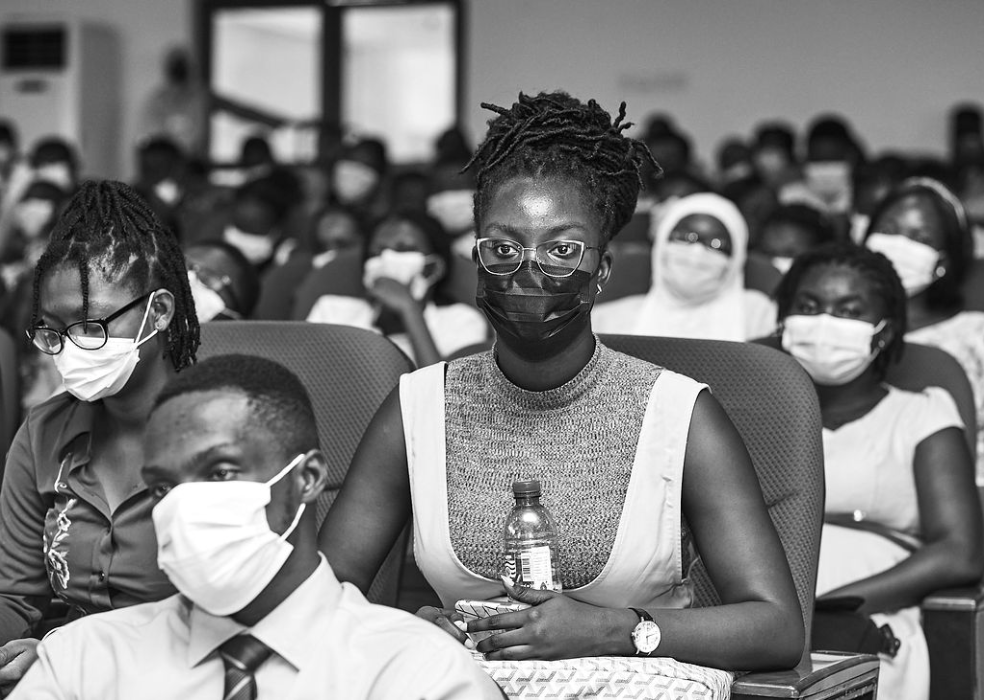
The Ghanaian Dream is Not What You Think
Just before one of my recent trips out of Ghana, I asked the driver who usually takes me to the Accra airport if he would like to go with me for the experience (he’s never been airborne). His response wasn’t what I expected. I admired him for his brutal honesty and was deeply saddened at the same time. He said, “Dr. P, I won’t lie to you. If I go with you, I’m not coming back.” And he is not alone.
As I’ve been interacting with young people in Accra mainly, but in Ghana generally, it seems the Ghanaian dream is: to get out! i.e. to get out of the country to seek greener pastures. The Ghanaian dream is to exit the nation and l find that so sad on many levels. At the same time that excites me. Let me explain.
THE BAD, SAD & MAD
l find it sad in the sense that whatever the push factors are, they are potent enough to drive a collectivist society that is really keen on kith and kin, in other words one in which friends and family mean so much, to want to leave spouse and children, or parents, to go and struggle in another land just to keep body and soul together. What would make many of our people expire in the wilderness, literally die in the deserts of the Sahara en route to Libya and such, or be buried alive in the Mediterranean Sea between Africa and Europe in desperate attempts to get a better life?
Shame on the fathers and mothers who are making life impossible for our young people. I can totally understand why five hundred (500) years, or even two hundred (200) years ago, we would be forced to get into ships to sail to the Americas but today if anybody brought that same ship people will voluntarily fill it en mass and say, “Take me to the Americas, take me to the Caribbean, take me to Europe, take me to wherever. l want to work for whoever, for whatever; just to get out of here.”
I remember being in a conference last year at Cape Town, South Africa when someone did an incredible presentation on what Ghanaians and other Sub-Saharans go through in wanting to reach Europe by all means, literally. It was revealing how a revived craze is trying to go around the Senegambia coast to the Canary Islands, an Atlantic maritime route largely considered “the most dangerous sea passage for Africans trying to reach Europe.” Regarding the Sahara route, one of the funny but sad question was: “How many Africans can fit into the bucket of a Toyota Hilux pickup truck?” They say, “One more!” One more!! They keep filling and filling and filling these truck buckets with human beings and carry very little fuel and food supplies so they can travel light and transport more people. Whenever there is a breakdown or some delay, people die like flies. The dream becomes a nightmare. O WHY?
THE GOOD
On the other hand, what good can there be in all of this, legitimate and illegitimate attempts at migration alike? Why is there some excitement in my heart? There is titillation because God is a global God and he calls people whenever He wants wherever He wants them to accomplish His eternal purposes. Yes!
One day Paul of Tarsus, the lawyer-turned-preacher, was in Athens, Greece and delivered a ‘TED Talk’ at the Areopagus. Luke the doctor-turned-investigative writer records in parenthesis how “All the Athenians and the foreigners who lived there spent their time doing nothing but talking about and listening to the latest ideas” (Acts 17:21). “Ideas worth spreading,” TED would say. But I digress.
One of the things Paul shared was that God who made us all from one original man, Adam, is the one who determines our boundaries, where we live, and in what period or era in history (Acts 17:26-27). People movements are actually God movements. You see that throughout Scripture, from Genesis to Revelation. A personal attestation to this scriptural reality is how I never wanted to leave the land of my birth, Ghana, to be domiciled in another land, especially outside of Africa. I had no such plans. And I married a woman with a similar mindset. We were doubly resolved. Ironically, my wife, Anyele, was born in Canada and moved to Ghana when she was barely two years old but had no desire to return to the land of her birth. In fact, she had never used that Canadian passport to get back to Canada. Two dozen years later.
One evening in August 2006, God spoke to me so clearly. This was barely three weeks after we were married. I was in a Lausanne Younger Leaders conference near Kuala Lumpur in Malaysia when I heard this in my spirit: ‘It’s my world and l send you where I want you.” Huh! Then in January 2008, the LORD spoke very clearly to us both from Genesis 12. It was just our ‘usual’ morning devotion on an ‘ordinary day’ when these words literally jumped off the pages of scripture: “Leave your country, your people, and your father’s household. And go to a land I will show you.” With no such prior plans of ever leaving Ghana to school or work, in a dramatic fashion our lives were turned upside down. By June I was serving with the United Nations Operation in Cote d’Ivoire (peacekeeping soldier) as a military captain and medical doctor to the U.N. staff and troops mainly, and some local Ivorians. By July, Anyele had been ‘kicked out’ of Ghana too to Montreal, Canada, going to pursue her master’s in economics at McGill University. The first time she was back in two-and-a-half decades.
So that’s the exciting part, that God may be calling people to fulfill His grand purposes in the Arab States, Europe, in another Africa country, the Americas, Australasia… wherever. But l pray that we would be able to help those who are going to go well. And also let our contacts in their destinations receive them well. It behoves on the Church in Ghana, in particular (which accounts for over 70% of the population), to find a way to prepare people well, including blessing them with a healthy diaspora missiology, so they may go well and thrive. It cannot be overemphasized that merely getting to America, Europe or China, is no guarantee one will be successful. We give money to poor people in Canada. There are homeless beggars who have come to squat on our property in America. And the poor in the West are not of only one colour of skin.
Having said that, surely we can do more, much more, to help whoever longs to, or is called to, stay in the land of their birth and make it in Ghana, Nigeria or anywhere in Africa, to be able to make it well also, and very well for that matter.
WHAT’S BEST FOR YOU
Find out what God’s great purpose and plan, position and place (including geographical location) is for your life, for the One who made and redeemed you is a global God. It might not be what you thought. Bottomline: You are only going to prosper where God has purposed and planned you to be planted. Make sure you are planted by God in that place–whether it is in Africa or elsewhere–and in that particular period, where and when you will prosper. Think on these things.
Post Script
Here’s a PEP Talk on ‘The Bad & Good about the Ghanaian dream.’
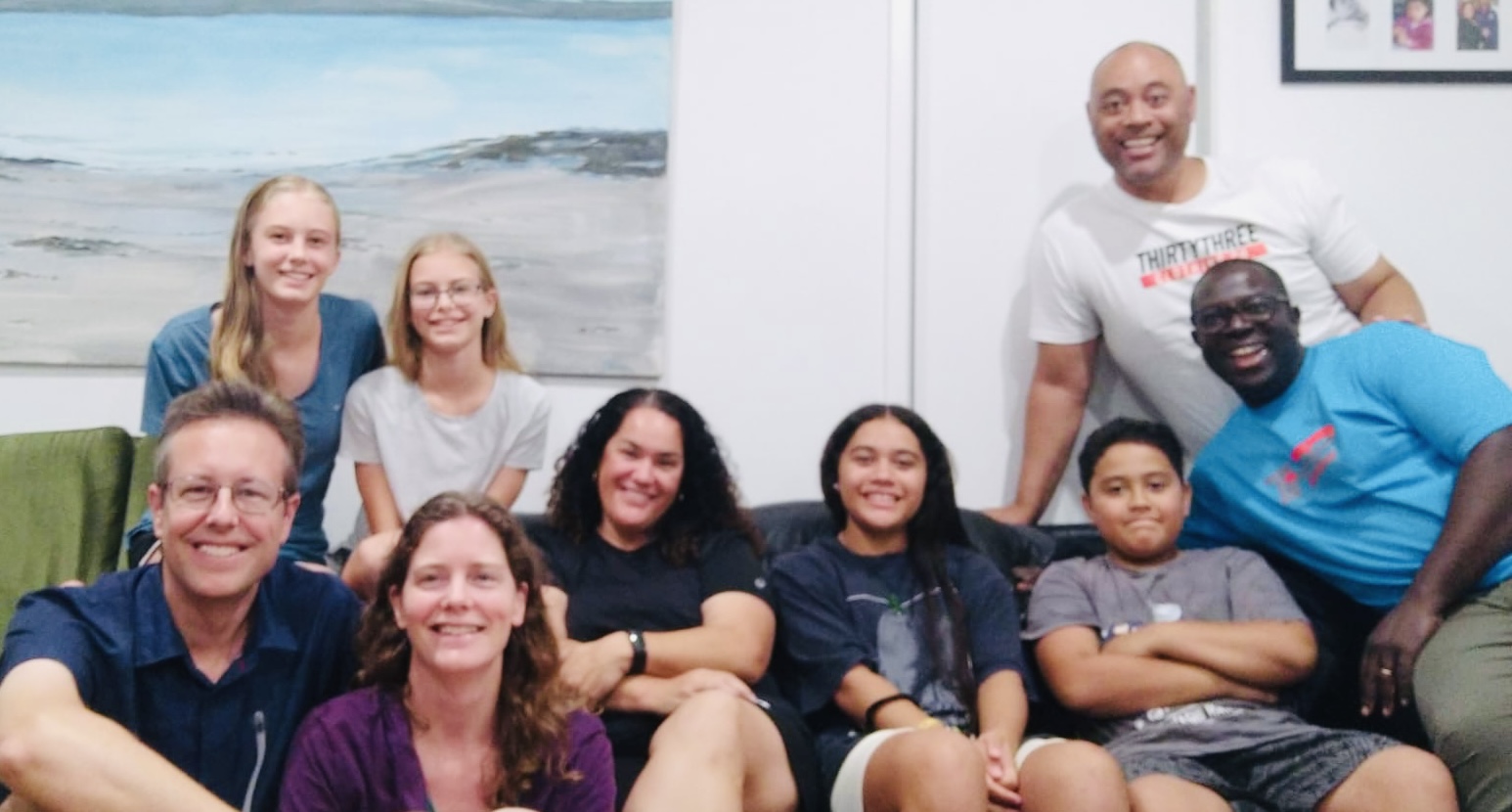
You may have my bag but not my friends.
An exhortation on not allowing circumstances and people who know no better rob you of the wealth of intercultural relationships in our diverse, complex and globalized world.
MYSTERY OF THE MISSING BAG–WHY ME?
I was the last one to walk out of the airport arrival hall at Gold Coast in Australia. I had all the customs and immigration officers to myself, nearly a dozen, yet I gave them absolutely nothing to do. I not only had nothing to declare, I had no bag! Apparently, my only checked-in bag on the three-and-a-half hour NZ 179 flight from Auckland, New Zealand to Gold Coast, Australia had never been loaded onto the plane in the first place. I had waited and waited in vain for it until when nearly everyone on this very full flight had left the baggage hall and Carousel 6 was literally bare, I approached the Baggage Counter to complain about my missing travel companion.
The chap at the Air New Zealand counter was very nice but his assumption that I was going to be in Gold Coast ‘forever’ fascinated me (I’m surprised I wasn’t annoyed).
“Oh sorry sir but your bag will be delivered to you at home tomorrow,” said he.
“Tomorrow? Who told you I’ll still be here tomorrow,” I quizzically retorted.
It was obvious he felt he was doing me a great favour by offering me special at-your-door delivery but I was not amused. Not only did I need the items in my bag today; I was not going to be in Gold Coast in the morrow. This was a 24-hour meet and greet and off to Adelaide, another two-and-a-half hour flight to the western half of the Australian subcontinent.
By now my mind had begun to formulate various plausible permutations why I alone (for I saw no one else approaching the Baggage Counter to lodge a complaint) had my bag delayed. Why me? What was so unique about me that my bag would be singled out for NOT delivery? The only other thing I knew made me different was that I was the only Black African on the flight. Did this have to do with anything?
Interestingly, as I passed through the Auckland airport earlier I had taken a photo in front of the All Blacks memorabilia shop and tweeted “I wonder why I feel so #welcome. #AllBlacks vs #WhitesOnly. How the times have changed–this one, for the better. #NewZealand rocking it!” Did someone spot that and nab me? Was I too quick to praise New Zealand for progressive race relations? Did this bag saga really have anything to do with my Black skin at all? It is easy to read racism into nearly everything once you’ve been a victim of that dehumanizing attitude and act, I must admit. I resist that. I resent that, even.
MYSTERY OF INTERCULTURAL RELATIONSHIPS–SO WORTH IT
All those thoughts and feelings totally dissipated once I set eyes on the last two people left in the welcome area: Julia and Billy-Jo, two of my special friends from the 1997 cohort of the World Vision Youth Ambassadors! Sooo worth the hustle! I had had the privilege of being a World Vision Youth Ambassador for Ghana in 1996 and had the additional honour of returning in Julia and Billy-Jo’s year as a staff intern, together with Claudia from Colombia.
Julia had represented Canada back then and for her, this was our third in-person meeting since 1997 (Prague 2015, Ottawa 2021 and now Gold Coast 2023). But Billy, I had not seen in-person at all since our teenage years! Billy-Jo (yes, she was the first lady I met called Billy–she was way ahead of the gender conversations today!) was the Youth Ambassador from New Zealand. Again, the first Pacific Aboriginal I had ever met, a beautiful Maori, inside and out. Billy’s since become a senior nurse, married to Matt (great guy!) with whom she has three children and migrated to Australia. Interestingly, both Julia and Billy-Jo’s husbands are called Matt. Julia’s Matt is American while Billy’s Western Samoan.
What an incredible day of food, fellowship and fun we had all day, at home and at the Burleigh Beach. The unadulterated love, the open-hearted learning, the deep laughter… What a precious gift we received from Dr. Jerry and Mama Ruth Chang of World Vision Taiwan a quarter-of-a-century ago, a gift that keeps giving, even today.
Now I’m glad our children are getting to know each other as well. The gift ripples on. Just before my family permanently headed to Ghana after a dozen years of being resident in Canada, Julia’s two girls and my brood had a whole day together at their home, right outside of Ottawa, Ontario. In fact, even in the midst of the jamboree we made a WhatsApp video call to Ghana for my older girls to say “hi” to their Canadian sisters. And now that I’ve met Bella and Asher, Billy’s last two (the oldest is away playing rugby and doing school in New Zealand), we have already started conversations about getting them to visit Ghana!
MYSTERY OF INTERDEPENDENCE
Friends, that’s how it ought to be. People are people, made in the image and likeness of their divine Creator, and made to link up with that source, live, love, learn, and lead, leaving a good legacy. Becoming a World Youth Vision Youth Ambassador was a life changing experience–50 young people from 50 different countries. That opened my mind a lot and opened the world to me. As I’ve said before, “My heart expanded and has never been able to shrink again.”
Back to the mystery of the missing bag. For sure I felt very special, having been singled out for some (or no) reason. For good or ill, that’s a conversation for another day. Suffice it to say, this has been a fascinating week, beginning on Monday March 6 in North America (Toronto, Canada and Houston, Texas, USA) with a celebration of the land of my birth’s Independence Day and her renaming from ‘Gold Coast’ to Ghana. I was now ending the week in another Gold Coast, of Australia. The same chaps christened and colonized both; on either side of the equator. What we really need in this world, from individuals to nations, is interdependence; not dependence or independence per se. We were made for this! And we all ought to live the way we were purposed to in order to flourish personally, as families and communities, in the corporate world and among the commity of nations.
In the mean time, you can have my bag but you won’t rob me of the richness of interdependent, intercultural relationships. Never!
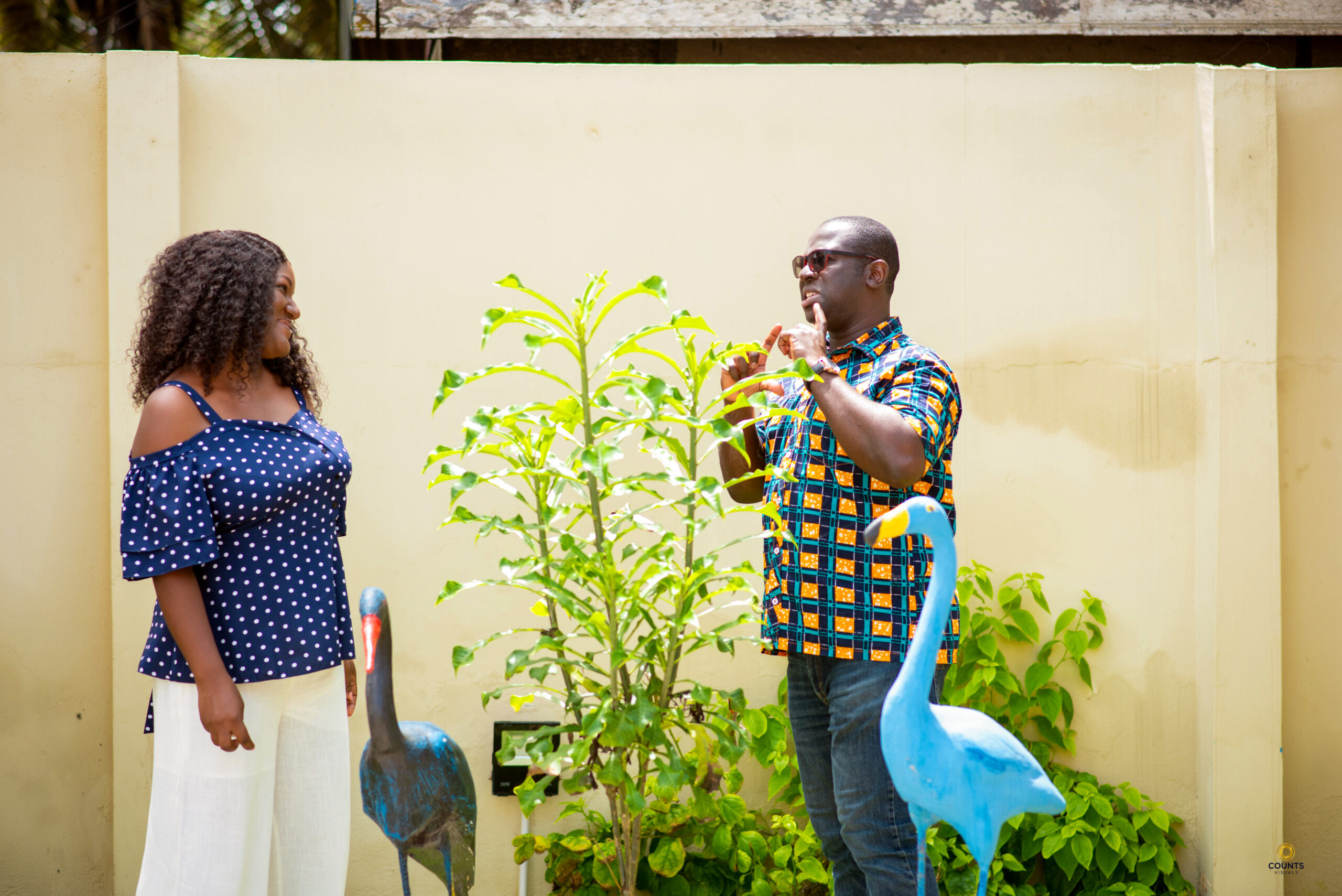
How to Apologize Properly: Seven Succinct & Sturdy Steps.
Let’s talk about apologizing properly. Some people are too prideful to apologize when they err (including me, sometimes). That’s so wrong. But even for those who know they are in the wrong and want to make things right, they often still get making things right wrong.
Imagine my shock, when l was scheduled to have a meeting with one of the top CEOs in Africa and l kept waiting and waiting and waiting and… this person wasn’t showing up. So I signed off from Zoom about 20 minutes later and sent a message: “I hope you’re okay…” etc. etc.
It wasn’t until the next day when this leader sent what was supposed to be an apology. All this person said was, “Apologies.” End of story. What?! I was shockprised. “Is that how to apologize?” I soliloquized. Then l began to understand why only a couple of weeks earlier one of my close friends who is also a top executive of a Ghana Club 100 company shared with me how one of my daughters had totally shocked him. Apparently, she had stepped on him or something of the sort (l forget) but that wasn’t the source of the shock. It was how she apologized. That so astonished him and he said to himself, “I’ve got to learn how to apologize this way.” He is now actually teaching his family that this is how to apologize properly henceforth, when you do something wrong.
This is the way to apologize, for acts of commission (doing what you’re not supposed to do) and omission (not doing what you’re supposed to do) alike:
- Mention the fellow’s name: “Anyele.” “Frankie.” Mentioning a person’s name calls their attention, makes it personal, and connects us to the caller.
- Spell out your offence: “l missed our appointment” or “l did not put the money in the bank like you had asked me to”
- Acknowledge you erred, openly admitting it: “l am wrong”
- Let them know you regret it, verbally articulating it: “I am sorry”
- Ask for their pardon: “Please forgive me.”
- Wait for their response (hopefully they can process right there and then and also give you a response in the affirmative).
- Thank them (no matter the response).
So here’s an illustration of how my CEO friend should’ve apologized: “Yaw. I totally missed our appointment and stood you up. I am wrong. I am sorry. Please forgive me.” This is the way to apologize properly. Just saying “apologies” or a half-hearted “oh sorry” in a huff doesn’t cut it. I am learning to do this better and better because I realize that sometimes when I’m not really really sorry I don’t want to go through this process and certainly don’t want to make the above string of statements.
Giving the other person the opportunity to forgive you by saying “please forgive me” is very empowering for the offended party. It kind of disarms the offender simultaneously too. I hope you’ll practice this and that true transformation will transpire because you are truly deeply sorrowful for what you did wrong even if it’s the slightest thing. Remember, “Ms. ABC, I did XYZ. I am wrong. I am sorry. Please forgive me.” Then await their response and thank them. This is the proper way to apologize. Some even go an extra length to state what they’re going to do to make things right and/or renegotiate the promise.
I am wary of people who are not self-aware enough to recognize they’ve done wrong, whether upon self-reflection or via feedback. And I don’t trust those who won’t say sorry after they’ve been made aware of it, and do it seriously and sincerely. I won’t do business with them because they have low integrity. Of course ,the first layer of integrity is keeping one’s word. But when inadvertently through extenuating circumstances one is unable to, to keep one’s integrity we still need to acknowledge that our integrity is unraveling (not just pretend we never gave our word in the first place) and then still honour our word by apologizing in the above manner and renegotiating.
Apologizing properly is not a trivial matter. It has saved personal relationships, families, communities, organizations and even nations. Let’s begin to take apologizing properly and sincerely seriously: on a personal level, then in our families and communities, ultimately in our corporate world and national life. Now, go and do likewise and teach the people at your workplace, on your team, and even your spouse and cubs to do same. That’s the way to go.
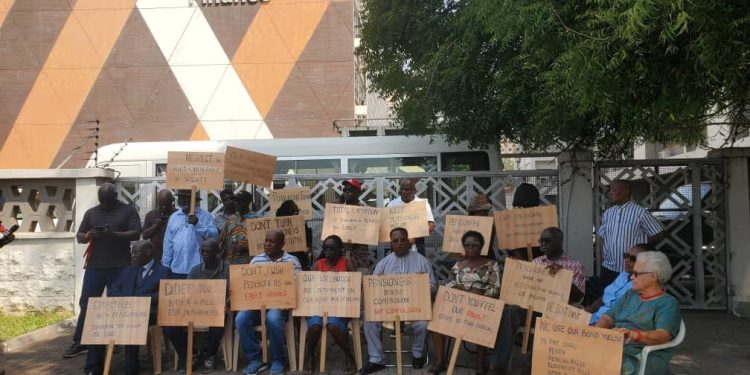
FROM PROFESSOR TO PICKETER: The Lost Generation and the Missing Money
Ghana is neither worth living for nor dying for. That’s how many feel at the moment. Honestly. Think about this: I’ve known Uncle Kweku since his graduate student days on the University of Ghana campus. I was only a lad then. He would later complete his graduate studies, an MPhil in linguistics, and top it up with a PhD from Oregon, USA.
After an illustrious career as an academic (see his brief bio here on the University of Ghana website) he not only retired as a full professor but even served as Pro Vice-Chancellor of Ghana’s premier university. What do we find the illustrious son of Ghana doing these days? Picketing on the premises of Ghana’s Ministry of Finance to demand that the government exempts his and fellow pensioners’ bonds from being sequestered in the dubious Domestic Debt Exchange (DDE) programme. I know for a fact that virtually all of Prof. Kweku Osam’s pension monies are in these bonds. Ei! A former Chief Justice also picketing alongside the other day is reported to have said, “I am over 70 years now. I am no longer government employed, my mouth has been unguarded, and I am talking, and I am saying that we have failed.”
“BACK TO THE FUTURE”
When Uncle Kweku overtly verbalized to the media in an interview on one of the picketing days that he would dissuade his children from ever investing in the Government of Ghana’s financial instruments because “they are risky,” he seemed to have read my mind. Seriously. For while I agree that it is despicable to draw the aged into this DDE debacle and punish pensioners who have planned well for their future and lent their own monies to government to work with, I have an even greater concern for the young people of the country who might take decades to recover from this rude shock. It has taken years to grow a savings and investment culture in Ghana.
As previously started in an earlier article on this matter, “I am pained that, ‘The fathers have eaten sour grapes, and the children’s teeth are set on edge’ (Ezekiel 18:2). For over 20 years now, The HuD Group and I have championed a culture of savings and investments in Ghana, and had the JOY of seeing thousands heeding the call, especially young people.” I recently met one of the young men I used to travel the country with to inspire and teach young people to form investment clubs and start investing. He’s currently the managing director of a major investment company in Ghana. He intimated how this whole DDE disaster made him shed several kilograms over a month, being at the receiving end of verbal and other forms of abuse from frustrated and fearful investors. At the time we spoke, people were withdrawing an average of 100 million Ghana Cedis each day from his outfit. He had already dispatched 2.5 billion Ghana Cedis when we held our conversation.
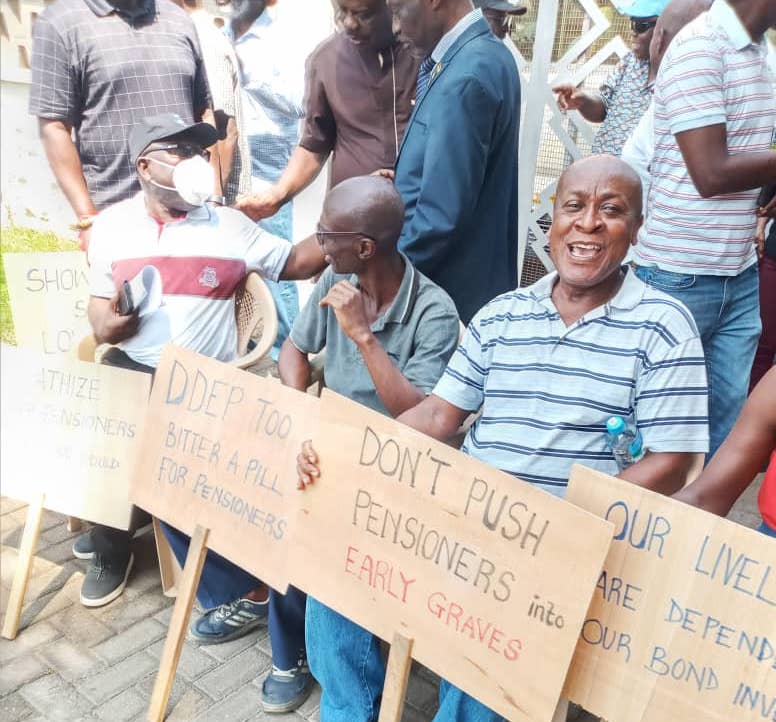
A zoom in on Prof. Kweku Osam, picketing at the Ministry of Finance, with his fellow pension bondholders
BACK TO THE PENSIONERS
So what exactly are we working for? The calibre of pensioners-turned-picketers is disheartening: doctors, engineers, civil servants… If retired professors and chief justices are protesting, what about the no-namers and the many who are too old or too ill to hit the streets? I am privy to a WhatsApp message Prof. Kweku Osam sent that was meant to be just informational, but ended up being very transformational for me:
The last time I took part in a public demonstration against a government of Ghana was in May 1983, as a fresh graduate student. That was when students in the country rose up against Rawlings and his PNDC. Today, God willing, I’ll join fellow Pensioner Bondholders to protest at the Ministry of Finance. The government should leave Pensioner Bondholders alone. Touch not the Pensioner Bondholders.
Think about it: Uncle Kweku began his working life protesting the government. Forty years later, he is ending his working life with yet another anti-government protest. Virtually all his lifesavings is now being held at ransom by a government that has misled and mismanaged her affairs, Covid-19 and Russia-Ukraine notwithstanding. After forty years of wandering in the wilderness between the 1983 protest and the present one on the eve of our sixty-sixth independence commemoration, Ghana itself is a pensioner by age, without much to show for it. We’ve got to do better for our people, old and young alike. Seriously.
Prof. Osam’s generation–my parents’ generation–is the same one the current Finance Minister, Uncle Ken, belongs to. It is the same crop of people who plotted military coup d’etats a generation ago in their youth. Now they won’t exit quietly either, not without a financial coup de grace. With trepidation, dare I call them the lost generation? And they did not only lose themselves and their way, they lost money–theirs and ours.
But to what will my generation and those following rise, having clearly observed that Ghana is not worth living for and Ghana is not worth dying for? That’s how many feel at the moment. Honestly. Think about it.

